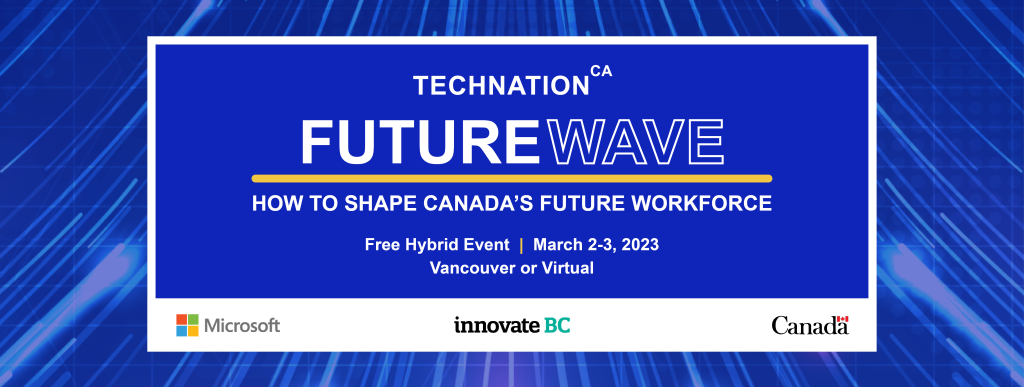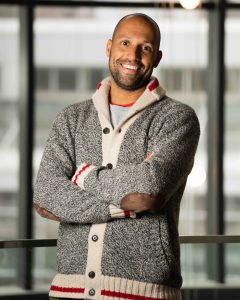
FutureWave is a free, hybrid, two-day digital event exploring the future of the tech workforce in Canada hosted at the Microsoft Canada Waterfront Office in Vancouver!
For Work-Integrated Learning (WIL) Month in Canada, we’re exploring how the technology industry can support the next generation of diverse talent, and we want you to join the conversation. FutureWave brings together diverse voices in tech and beyond to provide tech companies, HR professionals and educators like you a game plan to find and support the next generation of tech innovators. If you want to explore new ways to educate, recruit and support the future of the tech workforce, become an event partner.
CAPACITY HAS NOW BEEN REACHED FOR IN-PERSON REGISTRANTS. Please reserve your virtual seat to stream the event live!
This project is funded by the Government of Canada’s Student Work-Integrated Learning Program.
Day 1 Agenda:
- 8:30am – 9:00am: Registration and continental breakfast
- 9:00am – 9:30am: Opening and Keynote
- 9:30am – 10:15am: Panel 1: Future of (Gen-Z) Talent Acquisition
- 10:15am – 10:30am: Coffee Break
- 10:30am – 11:15am: Panel 2: E-Learning / Experiential Learning for Under-Represented Groups
- 11:15am – 12:00pm: Panel 3: Industry-Government Collaboration for Cultivating Tech Talent and Skills-Based Workplaces of the Future
- 1:00pm – 2:00pm: Networking Reception
Check out our BC CIO Briefing event from 2:00 – 3:30. Click to Register.
Day 2 Agenda:
- 8:30am – 9:00am: Registration and continental breakfast
- 9:00am – 9:30am: Opening and Keynote
- 9:30am – 10:15am: Panel 1: Neurodiversity and Accessibility Practice through Work Integrated Learning (WIL)
- 10:15am – 10:30am: Coffee Break
- 10:30am – 11:15am: Panel 2: Keeping the “A” in STEAM
- 11:15am – 12:00pm: Panel 3: Decolonizing WIL / Culturally Appropriate WIL – Building Awareness and Complexities of Diversity & Indiginization
- 12:00pm – 1:00pm: Networking Reception
- 1:00pm – 2:00pm: Speed Connect
Speakers:
- Angela Mondou, President and CEO, TECHNATION Canada
- Chris Barry, President, Microsoft Canada
- Hoss Zaouali, President, Tech-AdaptiKa
- Anya Klimbovskaia, Co-Founder and COO, Diversio
- Claudia Ivanova, Head of Human Resources, FISPAN
- Ashish Bhatnagar, Senior Manager, Recruiting, Amazon
- Keana Li, MBA Graduate, University of British Columbia
- Stephanie Hollingshead, CEO, Tap Network
- Jenna Gauthier, ACT! Centre Manager, Autism CanTech!
- Heather McCain, Executive Director, Creating Accessible Neighbourhoods
- Sascha Kissner, Facilitator, CAVE/SEED Youth Employment Program
- Jamie Millar-Dixon, Principal Consultant, BC Partners in Workforce Innovation
- John McLeod, Creative Director & Lead Instructional Designer, PathWise Solutions
- Lisa Moon, Regional Director – Alberta, NPOWER Canada
- Jenna Wyers, Human Resources Representative, Northwestel
- Darian Kovacs, Founding Partner, Jelly Digital Marketing & PR
- Heather McGilvary, Senior E-Learning & Future Workforce Consultant, TECHNATION Canada
- Dr. Carolyn Veldstra, Manager, Graduate Work-Integrated Learning Programs, University of British Columbia
- Dr. Anita Lam, Associate Dean, Teaching & Learning, Faculty of Liberal Arts & Professional Studies at York University
- Raquel Silva, ADaPT (Advanced Digital and Professional Training) Student
- Joel Krupa, CAO, Agents of Discovery
- Dr. Hilary Curry, Practice Lead – People & Change, KPMG
- Tomica Divic, VP, Operations, Innovate BC
- Sydney Goodfellow, Director, Digital Learning Lab, Digital Technologies SuperCluster
- Carol Anne Hilton, CEO & Founder, Indigenomics Institute
- Candice Loring, Senior Advisor, Indigenous Relations and Initiatives, Mitacs
- Desmand King, Indigenous Peer Champion, British Columbia Institute of Technology
- Jadelyn Psutka, Senior Manager, Indigenous Enablement and Recruitment, KPMG
- Jesse Steckley, Program Manager, Work-Integrated Learning, Business Council of Manitoba
Panels:
Future of (Gen-Z) Talent Acquisition
The panel discussion on the future of recruiting for emerging talent and Gen-Z features a group of experts (including one recent university graduate) from various fields who are well-versed in the changing landscape of the job market and the unique characteristics of the younger generation. To strengthen the future of Canada’s tech workforce, it is crucial for businesses to adapt to the next generation of workers.
This panel will explore strategies and best practices for attracting Gen-Z candidates to the workplace, and the importance of aligning the organization’s values with those of this generation. Panelists will draw on their own experiences and insights to provide practical advice and actionable steps for organizations looking to recruit and retain emerging talent and Gen-Z candidates.
E-Learning / Experiential Learning for Under-represented Groups
Workforce shortages within Canada’s tech sector suggest a training and education gap that needs to be closed – and quickly. The workforce is increasingly comprised of older adults, women, and minorities who seek to develop their skillsets but are unable to acquire these skills through traditional educational and training programs. Novel approaches are needed to provide effective training to the adult learner and flexible support for nontraditional students who must balance work-life demands with limited educational opportunities (Mohammadi et al., 2020).
This panel acknowledges that online and experiential opportunities can enhance organizational knowledge and learning performance, and will discuss real-life experiences, best-practices, and provide insights towards providing online and experiential learning experiences for under-represented groups to further enhance Canada’s tech workforce.
Neurodiversity and Accessibility Practice through Work Integrated Learning (WIL)
Neurodivergent individuals may have unique perspectives, strengths, and problem-solving abilities that can enhance an organization’s approach to accessibility. This is particularly relevant for roles related to tech, where accessibility is becoming an increasingly important consideration. By engaging neurodivergent students in WIL placements, businesses can gain valuable insights into how to create more accessible products and services that meet the needs of diverse users.
This panel discussion will explore how businesses can develop supportive hiring practices focusing on the strengths and abilities of neurodivergent individuals. This might include using recruitment strategies that target neurodivergent candidates or working with disability employment services to identify suitable candidates. Panelists will discuss how supports and accommodations can be offered to help neurodivergent students succeed in their WIL placements. By creating a supportive workplace culture, businesses can not only improve their accessibility practices but also foster a stronger workforce that benefits all employees.
Keeping the “A” in STEAM
While it is easy to understand the transformational power of STEAM education and its positive impact on the workforce, students studying Arts, especially BIPOC groups, continue to face barriers to join the workforce. There is a need to develop purposeful career pathways to build a more inclusive workforce that includes students from Arts & Humanities programs where BIPOC students are more likely to study.
Panel experts will share insights on how Arts & Humanities graduates are better prepared to face real-life problems with creativity and critical thinking. Panelists will discuss how we can develop inclusive career pathways for Arts students in the digital workforce, through initiatives that create inclusive cultures and offer equitable pay and opportunities for professional development. We also dive into the impact of modern technology & Artificial Intelligence in STEAM education, and how these skills might be taught in the future. The discussion aims to provide the audience with takeaways at an individual and structural level to create future pathways toward an equitable digital workforce.
Industry-Government Collaboration for Cultivating Tech Talent and Skills-Based Workplaces of the Future
The rapid pace of technological change and the increasing demand for skilled workers in the tech industry have created a pressing need for collaboration between industry and government. To explore this topic, our panel of experts affiliated with both sectors will discuss how we can work together to best cultivate the next generation of tech talent and create a skills-based workforce for the future.
The panel will discuss the challenges and opportunities of creating a collaborative approach to workforce development and explore the benefits of partnerships between industry and government, such as increased access to training programs, internships, and other career development opportunities for workers. Panelists will offer insights and recommendations for how industry and government can work together to create a more skilled and adaptable workforce that can meet the needs of the rapidly changing tech landscape. The key takeaways from this panel will be incorporated into an open letter of recommendations to the federal government, published by TECHNATION and its partners.
Decolonizing WIL / Culturally Appropriate WIL – Building Awareness and Complexities of Diversity & Indiginization
Decolonizing student work placements allows Indigenous students to bring their cultural perspectives and experiences into the workplace – an important addition to all companies doing business in Canada and in Indigenous lands and territories. This can help counteract the effects of colonialism by providing opportunities for Indigenous students to learn and grow in culturally safe environments, which is particularly important to bring Indigenous people into the digital workforce. Decolonizing internships involves recognizing and addressing the systemic barriers that Indigenous students face, such as access to education, racism and discrimination. Panelists will discuss how we can create supportive and culturally relevant learning experiences and career pathways for workers from all cultural backgrounds.
FutureWave Keynote Speakers
Chris Barry 
Chris Barry is the President of Microsoft Canada responsible for leading a world-class team who delivers transformative outcomes for Canadians. Through Microsoft’s partner ecosystem, citizenship efforts and employee engagement programs, Chris’s objective is to empower every person and organization across Canada to achieve more.
A veteran of the technology sector and proven transformational leader, Chris has over 20 years of experience at Microsoft and has held many leadership roles in sales and marketing for both Enterprise and Partner Groups in US, Canada and Globally. In his most recent role, Chris has been the Chief Operating Officer for Microsoft’s Industry Solutions business where he was responsible for defining strategies to maximize impact for top industry accounts and scaling solutions through partner ecosystems and worldwide sales teams.
Chris is passionate about driving meaningful and lasting relationships, building diverse and inclusive teams, and driving positive organizational outcomes. Chris believes culture is a powerful differentiator and delivering outstanding customer service requires leadership that emphasizes achievement, impeccable service, and problem solving through autonomy and inventiveness.
Chris is a member of the TECHNATION Board of Directors and resides in Oakville with his wife and teenage daughter.
Hoss Zaouali
I started a social enterprise that would provide free education to kids in developing countries. Creating Tech-AdaptiKa together with leaders who shared my passion for education, our organization has grown by leaps and bounds over the last eight years. While the for-profit side of our social enterprise built one of the first Metaverse for universal education, the not-for-profit branch launched a digital solution in Somalia. In addition, other international projects became possible in Haiti, Ghana and Tunisia.
Over the past 15 years, we have launched dozens of products internationally, from virtual campuses for universities and large corporations, to virtual incubators in the metaverse. Today, many companies in the USA, Canada, the EU and Africa have benefited from our digital products, and we are proud to pave the way to the Metaverse for universal education and professional development.
With the rise of Artificial Intelligence, and its impact on the job market (job displacement), we know that hundreds of millions of people will have to be retrained to fill the needs of tomorrow’s job market. With 41% of its population under the age of 15 years old, Africa is/will be at the center of these societal changes. It is my belief that online education can move education in developing countries forward at a rapid rate, skipping over traditional steps. I am proud to be able to participate in this transformation by implementing new and innovative digital products all over the world.
In 2017, I had the privilege to become a course facilitator at the Stanford LEAD program. Armed with my understanding of the emotional journey of the online learner, I contributed to the development of this program over the past five years. Today, the LEAD program gathers thousands of executive participants from 68 countries. Motivated by my own personal history of violence transformed through education, I hope to continue to clear a path to quality education so that collectively we learn to see more clearly.
Event Details